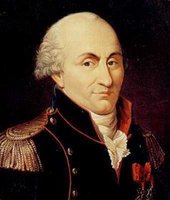Coulomb, Charles-Augustin de
From The Encyclopedia of Earth
June 11, 2008, 4:28 pm
Charles-Augustin de Coulomb (1736-1806), a French physicist best known for the formulation of Coulomb's law, which states that the force between two electrical charges is proportional to the product of the charges and inversely proportional to the square of the distance between them. The unit of charge, the coulomb, is named after him. Throughout much of his work, he performed experiments with a torsion balance (which he invented independently of Priestley), a measuring instrument designed to measure small forces by the torsion they exert on a thin wire. Coulomb also undertook services for the French government in such varied fields as education and hospital reform.
Further Reading
- Museum of the History of Science, Oxford. A Torsion Balace Electrometer by Watkins & Hill.
- Thiel College. Charles Augustin de Coulomb - Biography.
